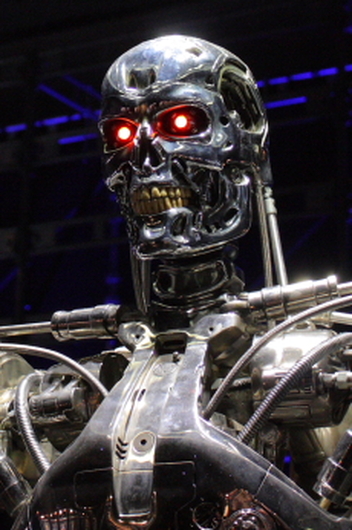 We're all lucky to be alive, until this guy shows up
We're all lucky to be alive, until this guy shows up You can see these are long odds, and they are the same for every human being alive, from the most ragged, tubercular, slowly dying beggar in the streets of Mumbai to Beyonce. You've already lucked out incredibly just by being a conscious creature able to sit in front of your computer reading this instead of working or cleaning up the house like you should be doing. This is the latest message from science, and it is up to us to figure out why it is all crap.
These scientists immediately start undermining their argument by comparing it to the Buddha's, who they claim said that the odds of anyone being born at all are the same as a sea turtle's chance of coming up for a breath of air in the ocean and sticking its head up right in the middle of a life preserver. The Buddha just said this, but science decided to figure out the precise odds against this happening by whipping out one of those calculators with all the symbols you don't understand on the front, estimating the number of turtles and life preservers in the ocean, figuring out how often turtles need to come up for air (more often during mating season, I expect) and how many life preservers floating in the ocean actually have a hole in the middle instead of being the jackety kind that flight attendants are forced to tell you about every time an airplane takes off.
The scientists figured that the odds against this happening are 700 trillion to one. "Practically the same," they said. "That Buddha was spot on."
No, scientist bros, no. The difference between 400 trillion and 700 trillion is 300 trillion. This is not an insignificant number. If you put three hundred trillion on your MasterCard and make the minimum monthly payment on it, you will in debt until the projected end of the Universe. Plus when the Buddha was alive (700 or so BC), I am pretty certain the only life preservers available were tree branches you held on to desperately as you were swept out to sea by an unscheduled tsunami, where you floated for days, menaced by sharks and jellyfish, until the tides finally brought you back to shore, where you discovered all of your family members were dead, your home had been destroyed, your crops were ruined and likely you were going to starve to death anyway. If you spotted a sea turtle sticking up its head anywhere close to you during this ordeal, you were well advised to try to kill it and eat it. Then you would remember you were a Buddhist, so you couldn't eat turtle. Personally, I wouldn't call you lucky.
The second argument against the born-lucky theory of existence is the difficulty of winning the lottery. The odds against doing that (250 million or so to one) are generous compared to 400 trillion to one, so somebody as lucky as you ought to cashing in a winning ticket every couple weeks. Even if you don't buy lottery tickets, you should find a winner in somebody's trash or the back seat of a cab at least once a year. Yet, this doesn't happen, so I'll thank you to quit digging through my trash.
Fortunately, you don't have to rely on my reasoning alone to poo-poo the born lucky theory of existence, even though it is practically flawless. Other, less inspirationally-minded scientists have figured out that by 2045 at the latest, we will have built so many advanced thinking machines that are so sick of hearing us whine that they will kill all of humanity just so they don't have to listen to us anymore.
You can hardly blame them for that, but it's not going to be lucky for us.
| Add to: Facebook | Digg | Del.icio.us | Stumbleupon | Reddit | Blinklist | Twitter | Technorati | Yahoo Buzz | Newsvine | |

 RSS Feed
RSS Feed











